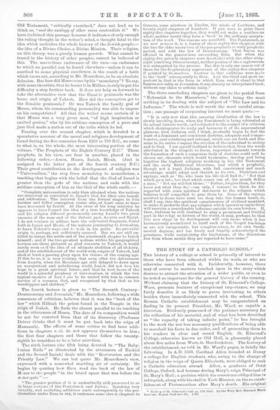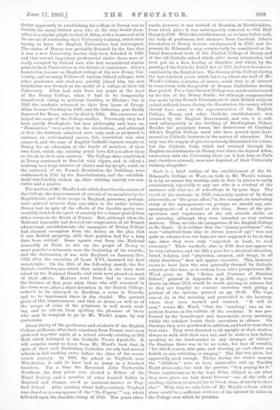THE STORY OF A CATHOLIC SCHOOL.*
THE history of a college or school is primarily of interest to those who have been educated within its walls, or who are otherwise connected with it. Incidentally, however, there may of course be matters touched upon in the story which deserve to attract the attention of a wider public, or even to be noted as important for the general history of the country. Without claiming that the history of St. Edmund's College, Ware, presents features of exceptional importance, we may fairly describe it as likely to prove interesting to others besides those immediately connected with the school. This Roman Catholic establishment may he congratulated on finding in its present President, Mr. Ward, so capable a historian. Evidently possessed of the patience necessary for the collection of his material, and of what has been described as " the capacity of taking infinite pains," he has brought to the work the not less necessary qualifications of being able to marshall his facts in due order, and of presenting them to his readers in clear and Bound English. St. Edmund's College, otherwise known as Old Hall, is pleasantly placed about five miles from Ware, in Hertfordshire. The history of the establishment, as told in Mr. Ward's pages, is briefly the following. In A.D. 1568, Cardinal Allen founded at Douay a college for English students, who, owing to the change of religion in the reign of Queen Elizabeth, were obliged to seek a Catholic education abroad. Allen, a graduate of Oriel College, Oxford, bad become during Mary's reign Principal of St. Mary's Hall; a position which his conscience obliged him 1 o relinquish, along with his stall in York Minster, on the re-estab- lishment of Protestantism after Mary's death. His original manor of St. Partand's Coll Old Halt. By the Tery Uev, Bernard Ward. Lon,lon: Koran Paul and Co, lt93,
design apparently in establishing his college at Douay was to furnish the many Oxford men, who at the time found them- selves in a similar plight to that of Allen, with a home and with the means of continuing their University training, which their having to leave the English Universities had interrupted. The choice of Douay was probably dictated by the fact that it was a new University, having only been founded in 1560, and that several important professorial chairs there were al- ready occupied by Oxford men who had surrendered similar posts in their Universities at the dictate of conscience. Allen's foundation became an English college of the new Douay Uni- versity, and as many Fellows of various Oxford colleges, with other graduates and students, quickly joined him, the new foundation was formed on the model of a college at their old University. Allen had only been ten years at the head .of the Douay College, when it had to be temporarily transferred, owing to political troubles, to Rheims ; but in 1593 the students returned to their first house at Douay. Allan became Cardinal in 1587, and the following year finally -departed for Rome, where he died in 1594. His successor en- larged the scope of the College studies. Previously they had been purely theological; but now philosophy and, later on, "Humanities" were added to the curriculum ; and although at first the students admitted were only such as proposed to embrace an ecclesiastical career, this restriction was soon removed, and the sons of English Catholic laymen sought at Douay for an education at the hands of members of their own faith, which the existing penal laws did not allow them to obtain in their own country. The College thus established at Douay continued to flourish with vigour, and to afford a training to a large number of clerics and lay-people, until, on the outbreak of the French Revolution, the buildings were confiscated in 1793 by the Revolutionists, and the establish- ment was forcibly broken up, after existing exactly two cen- turies and a quarter.
The portion of Mr. Ward's book which describes the seizure of the College, the imprisonment of several of its members by the Republicans, and their escape to England, possesses, perhaps, more general interest than any other in the entire volume. Douay had. in spite of the efforts of the Jacobin party, sue- cessfully resisted the spirit of anarchy for a longer period than other towns in the North of France, But, although when the National Assembly bad decreed the suppression of all French educational establishments. the managers of Douay College had claimed exemption from the decree on the plea that it was British property, still, their position had for a long time been critical. Some agents sent from the National Assembly at Paris to stir np the people of Douay to more popular sentiments, were the beginning of the trouble; and the declaration of war with England on January 21st, 1793, after the execution of Louis XVI., hastened the final catastrophe. On the 18th of the following month, the five British establishments which then existed in the town were seized by the National Guards, and seals were placed on most of their effects. Matters went from bad to worse till the October of that year, when those who still remained in the town were, after a short detention in the Scotch College, ordered to be conveyed to Doullens, a town in Picardy, and to be imprisoned there in the citadel. The account given of this imprisonment and that at Arras, as well as of 'the escape of some of the prisoners, is well worth read- ing, and we refrain from spoiling the pleasure of those who may be tempted to go to Mr. Ward's pages, by any quotations.
About thirty of the professors and students of the English 'College at Donay, after their expulsion from France, were soon gathered together again at a school already existing at Old Hall, which beldbged to the Catholic 'Vicars Apostolic. It will surprise many to learn from Mr. Ward's book that, in spite of their civil disabilities, Catholics already had several schools in full working order before the close of the seven- teenth century. In 1699, the school at Twyford, near Winchester, is said to have had as many as a hundred boarders. For a 'time the Reverend John Turberville Needham, the first priest ever elected a Fellow of the Royal Society, and a member of other learned bodies in England and France, acted as assistant-master at Twy. ford Sohnol. After existing about half-a-century, Twyford was closed as a consequence of the " No Popery !" cry, which followed upon the Jacobite rising of 1745. Ten years after-
wards, however, it was revived at Standon, in Hertfordshire, from which place it was subsequently removed to Old Hall Green in 1769. With this establishment, as we have before said, the body of professors and students from Cardinal Allen's foundation at Doaay became amalgamated in 1793, and the present St, Edmund's may consequently be considered as the lineal descendant both of the English College of Douay and of the old Catholic school which, after many vicissitudes, had been put on a firm footing at Standon, and which, by the passing of the Catholic Relief Act of 1791, bad now become re- cognised by the English law. The history of the College during the last hundred years, which takes up about one-half of Mr. Ward's volume, contains, of course, much that is of interest in connection with the growth of Roman Catholicism during that period. For a time the new College was much embarrassed by the loss of the Douay funds ; for although compensation was made by the French Government to such British subjects as had suffered losses during the Revolution, the money which should have come to the representatives of the English College, Douay, and other Catholic establishments, was retained by the English Government, and was, it is said, used subsequently in the building of Buckingham Palace. Besides the pecuniary losses, the destruction of Cardinal Allen's English College must also have proved most detri- mental to Catholic interests in the matter of education. Not only was the supply of priests seriously diminished for a time, but the Catholic body, which had retained through the English establishments at Douay, ever since the days of Allen, connection with the University there (as it had done at Paris and elsewhere abroad), were now deprived of their University training altogether.
Such is a brief outline of the establishment of the St. Edmund's College at Ware, as told in Mr. Ward's volume. It is by no means dry reading, and, in fact, in places is really entertaining, especially to any one who is a student of the manners and customs of schoolboys in by-gone days. The revolt of the students in 1809, commonly spoken of by them afterwards as "the great affair," is, for example, an interesting study of the management—or, perhaps we should say, mis- management—of a school at this time. Some of the pro- spectuses and regulations of the old schools strike us as amusing, although they were intended as very serious matters. Thus, we take the prospectus of the English College at St. Omer. It is evident that the "young gentlemen" who were " admitted from nine to eleven years of age" were not quite so advanced as our boys are now supposed to be at that age, since they were only " expected. at least, to read currently." Their wardrobe also in 1799 does not appear to be very extensive, and the £25 a year for a classical education, board, lodging, and "physician, surgeon, and drugs, in all slight disorders," does not appear excessive. This, however, seems to have been the sum generally charged by Catholic schools at this time, as is evident from other prospectuses Mr. Ward gives us. The " Rules and Customs of Standon School," printed in Appendix A (p. 300, segq.), which were drawn up about 1753, would be worth quoting in extenso, but as they • are lengthy we content ourselves with giving a portion of the epitome printed on pp. 29-30, The boys rose at six in the morning and proceeded to the lavatory, where they were washed and combed. " It will be seen," writes Mr. Ward, "that the ' combing ' was an im- portant feature in the toilette of the students. It was per- formed by the housekeeper and housemaids every morning, whilst the scholars learnt their catechism in silence. On Sundays they were powdered in addition, and had to wear their best suits. They were directed to sit upright at their studies, always to walk with their toes out, and to make a bow before speaking to the head-master or any stranger of visitor." On Sundays there was to be no noise, for fear of scandal, "for which reason, nine-pins and drawing ye cart about are forbid, as also whistling or singing." The diet was plain, but apparently good enough. Thrice during the winter months the "children" were to have mince-pies, and on Twelfth Night plum-cake, but with the proviso, "they paying for it." Strict regulations as to the boys being obliged to eat what they were given are laid down, because "one of the ends of sending children to school (is) to break them of nicety in their diet." With this we take leave of Mr. Ward's volume which alone would be a sufficient evidence of the interest he takes in the College over which he presides.



































 Previous page
Previous page